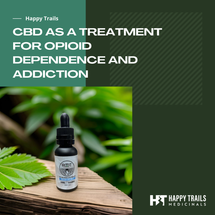Posted by Happy Trails on Dec 6th 2024
CBD as a Treatment for Opioid Dependence and Addiction
Opioids, widely prescribed for pain management, have become a double-edged sword in healthcare. While effective for pain relief, their widespread use has fueled an opioid crisis across the U.S., devastating individuals and communities. Traditional treatments such as counseling, medication-assisted therapy (e.g., methadone or buprenorphine), and lifestyle modifications are commonly used but often come with limitations, including side effects and dependency risks.
Emerging evidence suggests that plant-based medicines like cannabidiol (CBD) could offer a safer, alternative approach to managing opioid dependence and addiction, potentially reducing reliance on traditional pharmacological treatments.
The Endocannabinoid System’s Role in Addiction Treatment
The endocannabinoid system (ECS) plays a vital role in regulating physiological processes, including pain perception, mood, and stress responses. The ECS comprises cannabinoid receptors (CB1 and CB2) distributed throughout the brain and body, interacting with both endogenous cannabinoids (produced naturally by the body) and phytocannabinoids from plants like cannabis.
CBD, a non-psychoactive cannabinoid, interacts with the ECS to modulate these processes without producing a "high." This modulation has shown promise in managing symptoms related to opioid use disorder (OUD).
Key Research Findings
- Preclinical Studies:
- A study published in Neurotherapeutics found that CBD reduced heroin-seeking behavior and anxiety in rodents with induced heroin addiction. These effects were attributed to CBD’s ability to regulate the ECS and mitigate withdrawal symptoms.
- Another preclinical study in Addiction Biology revealed that CBD reduced the behavioral and molecular changes associated with long-term opioid exposure, suggesting its potential to decrease relapse rates.
- Human Studies:
- A 2019 randomized controlled trial published in The American Journal of Psychiatry examined 42 individuals with heroin use disorder. Participants received either CBD or a placebo. Those treated with CBD reported significant reductions in heroin cravings and anxiety levels compared to the placebo group. Importantly, these effects lasted up to seven days after the final CBD administration, indicating its potential for sustained benefits.
- Another study in JAMA Psychiatry demonstrated that CBD, when combined with Nabilone (a synthetic cannabinoid), reduced withdrawal symptoms and cravings in individuals who had failed conventional treatments such as methadone or buprenorphine. No severe side effects were reported, emphasizing its favorable safety profile.
Benefits of CBD in Opioid Recovery
CBD offers unique advantages as a treatment for opioid dependence:
- Non-Psychoactive: Unlike THC, CBD doesn’t produce intoxicating effects, making it suitable for individuals seeking to avoid psychoactive substances.
- Reduces Cravings: By modulating ECS activity, CBD has shown efficacy in reducing opioid cravings and withdrawal symptoms.
- Anti-Anxiety Effects: CBD’s ability to lower anxiety levels can help individuals manage the psychological challenges of recovery.
- Anti-Inflammatory Properties: Many individuals with opioid dependence suffer from chronic pain. CBD’s anti-inflammatory effects provide pain relief without the risk of dependency.
The Case for Continued Research
While initial findings are promising, further research is needed to:
- Establish optimal dosing guidelines for CBD in OUD treatment.
- Assess long-term safety and efficacy.
- Explore its potential in combination therapies with other plant-based or traditional treatments.
As the opioid crisis continues to pose a significant public health challenge, exploring innovative solutions like CBD is critical.
Explore THC-Free CBD Solutions
For those interested in incorporating CBD into their recovery journey, a THC-free option may be ideal to avoid psychoactive effects or drug testing concerns. Root Therapeutics offers a Water-Soluble THC-Free Broad-Spectrum CBD Tincture
 designed for maximum absorption and effectiveness. This product allows individuals to experience the therapeutic benefits of CBD without THC-related complications.
designed for maximum absorption and effectiveness. This product allows individuals to experience the therapeutic benefits of CBD without THC-related complications.
A Path Forward
CBD represents a promising, plant-based tool in the fight against opioid addiction. By leveraging the natural healing properties of cannabinoids, we may pave the way for safer, more effective recovery strategies that prioritize both individual well-being and public health. Together, science and nature can illuminate a brighter path toward recovery.


